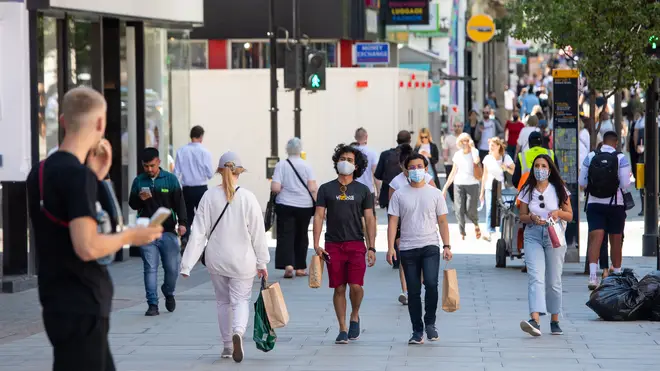
Richard Spurr 1am - 4am
17 September 2021, 07:44

The Office for National Statistics (ONS) said the figures remain ahead of pre-pandemic levels.
UK retail sales dropped in August for the fourth consecutive month as grocery sales were impacted by more people returning to restaurants and pubs, according to official figures.
The Office for National Statistics (ONS) said retail sales volumes dropped by 0.9% last month, following a 2.8% fall in July.
However, retail sales volumes remain 4.6% ahead of pre-pandemic levels.
The drop in sales for August came as a surprise to analysts, who had forecast a 0.7% increase for the month.
Our latest data show retail sales fell by an estimated 0.9% in August 2021 compared with July 2021.
This is 4.6% higher than their pre-pandemic levels (February 2020) https://t.co/NJVUFX65CO pic.twitter.com/rYoq0wozo4
— Office for National Statistics (ONS) (@ONS) September 17, 2021
It represents the first time since 1996 that retail sales have dropped for four months in a row.
Jonathan Athow, ONS deputy national statistician for economic statistics, said: “Sales fell again in August, though not nearly as much as in July, and, overall, remained above their pre-pandemic level.
“Other data suggest that the drop in food stores’ sales is linked to an increase in eating out following the lifting of coronavirus restrictions.
“Meanwhile, motor fuel sales increased on the month as people ventured out more, but they remained below pre-pandemic levels.”
Food store sales slipped by 1.2% for the month, with many shoppers returning further back towards pre-pandemic habits.
It comes as data from Open Table has shown that restaurant reservations picked up last month while credit card providers highlighted a rebound in social spending.
Non-food stores saw a drop of 1.0% in sales in August 2021, partly driven by falls in department stores (-3.7%) https://t.co/CkxOu6dClo pic.twitter.com/klIZnYNe25
— Office for National Statistics (ONS) (@ONS) September 17, 2021
Meanwhile, non-food stores reported a 1% decline in sales volumes, driven partly by department stores, which saw a 3.7% plunge for the month.
Motor fuel sales volumes rose by 1.5% for the month as people continued to increase their amount of travel, although this remains below pre-pandemic levels.
The ONS also highlighted that, in the two weeks to August 22, around 6.5% of retailers said they were unable to get the materials, goods or services they needed due to ongoing supply chain challenges.
Department stores highlighted the biggest difficulties, with 18.2% of these companies stressing issues.
Meanwhile, 22% of food stores said they were able to source products they needed but had to change suppliers or find alternative solutions.
Erin Brookes, managing director at Alvarez & Marsal’s European retail and consumer practice, said: “Today’s figures should remind retailers to start planning for Christmas, which could be one of the most exciting on record, especially given restrictions last year.
“It will be critical to understand consumer demands and solidify nimble and responsive supply chains, which are only as strong as their weakest link.
“Despite the turbulent times, businesses should be asking themselves how to bolster and diversify their supply chains so that they are not just focusing on immediate issues but are also future-proofing their business against long-term changes in consumer habits.”